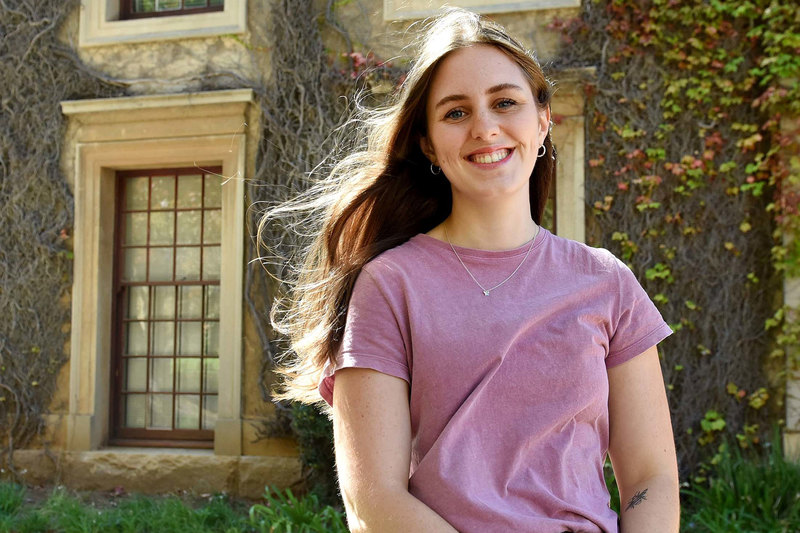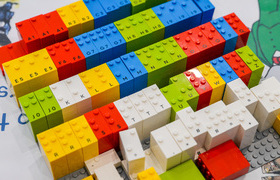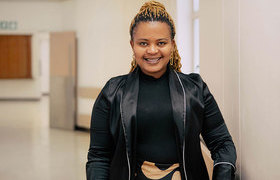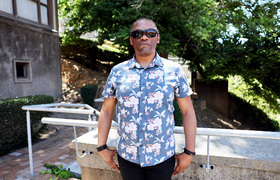World Autism Day: ‘I faced barriers but found my voice’
02 April 2024 | Story Niémah Davids. Photo Nasief Manie. Read time 7 min.
Perhaps to some, Tallulah Dorer-Perrin looks neurotypical (individuals with typical neurological development functioning). But that’s if you judge people at face value. Dorer-Perrin has autism – an “invisible disability” that makes every aspect of her life, including walking into a brightly lit lecture theatre alongside groups of loud students, doubly challenging.
However, things changed since her enrolment at the University of Cape Town (UCT) in 2022. Dorer-Perrin, a third-year Bachelor of Social Science student, learned to hold her own and her university experience altered her outlook on life. She speaks up when she needs to and has become an advocate for inclusivity, especially for students with disabilities, much to her family’s delight.
This World Autism Awareness Day, UCT News caught up with Dorer-Perrin to chat about her first-hand experience as a UCT student with autism and her campus highs and lows. She also touched on what the university needs to focus on to build a more inclusive community for students with autism.
“When you are autistic, many aspects of life are extraordinarily challenging, and failure occurs often.”
“When you are autistic, many aspects of life are extraordinarily challenging, and failure occurs often. This affects your self-esteem. My family worried about whether I would try again if I failed. Over time, they have seen me fall and get back up repeatedly. They are incredibly proud of how I have changed my view on making mistakes,” she said.
The stress factors
According to the World Health Organization (WHO), autism spectrum disorders (ASD) are a diverse group of conditions, characterised by some degree of difficulty with social interaction and communication. Other characteristics include atypical patterns of behaviour, such as difficulty transitioning from one activity to another, a focus on details and unusual reactions to sensations.
These make juggling an academic programme and general campus life tough. What may be considered as a relatively easy adjustment for some, is not that simple for Dorer-Perrin or others with autism. Coupled with the stress of her academic performance, a list of typical on-campus procedures causes her much anxiety. But what are they? She said things like a lack of recorded lectures, lighting adjustments in lecture halls and buildings, frequently requesting that students participate in group projects with peers and last-minute class venue changes make her life difficult.
“Group projects are incredibly stressful when you are forced to choose your own groups. Many with autism have no friends to be in a group with and are often greatly overwhelmed by the need to approach strangers,” she said. “Don’t even get me started on the lighting tones in buildings that change often and with no warning. This is very distressing for those of us with ASD and if the university could work on changing the way they approach these situations to improve our experience that would be great.”
Navigating her academic programme
These stress factors make navigating her academic programme arduous too. When she started university, Dorer-Perrin said she had no idea what to expect. But she spent copious amounts of time engaging in research and also found different, effective methods of managing her time. And by doing so, she started understanding the ins and outs of the campus environment a lot better.
Yet, after three years, there’s still no black-and-white approach to managing the social aspect of university life. So, she decided to stop pressuring herself into making friends, and as a contingency plan, started engaging in tutorials. Slowly she started to form relationships with her peers. And while many remain purely academic relationships, Dorer-Perrin still “counts them as wins”.
“I still struggle with when to disclose that I am neurodivergent.”
“In general, it is very tiring trying to adapt and fulfil what is required of you at university and this is only magnified by having ASD. You are expected to make lifelong friends at university, and this is very daunting,” she said. “Over time, things have become easier for me with the use of medication, which, is of course controversial, but I highly recommend people struggling to consider it. I still struggle with when to disclose that I am neurodivergent. Stigma has caused me to often keep this fact to myself and I haven’t found a correct way to deal with this. But I hope to improve and to start telling people one day.”
With the first term officially behind her, Dorer-Perrin said her third year has been a “huge test on my capabilities”. But she has adopted a one-day-at-a-time approach, which has counted in her favour.
The silver lining
Despite this list of challenges, Dorer-Perrin said there’s a bright side to her university experience too. Having regular access to mental health support, connecting with other neurodivergent students through UCT’s Students with Disabilities Forum and spending time in Disability Service’s quiet room, especially when the noise levels peak on campus, has been a godsend.
In addition, she described tutors in the Faculty of Humanities as excellent. Dorer-Perrin said they have supported her from day one and remain genuinely committed to ensuring that she succeeds at university.
“Humanities tutors have been amazing. Their support, understanding and commitment to their students’ success is unwavering and refreshing. They take the time to communicate with my support team to ensure that I succeed. I’m grateful for that,” she said.
Embrace the unknown
Even though university is not a walk in the park, she urged aspiring students with autism to consider an application, embrace the unknown and pursue an undergraduate degree programme.
“Remove those expectations. You don’t know if it will be too much. You don’t know if people will realise you’re different, and if they do, you don’t know if it will be a bad thing. You will have room to grow and opportunities to explore what you care about. And you deserve to experience university the same way neurotypical people do. It’s all in your hands,” she said.
“I faced many barriers. But over time I found my voice and confidence. I learned to advocate for myself and challenge discriminatory policies. I’ve formed meaningful relationships with my peers and continue to challenge negative perceptions of neurodivergent students to help make this a space where everyone feels like they belong.”
 This work is licensed under a Creative Commons Attribution-NoDerivatives 4.0 International License.
This work is licensed under a Creative Commons Attribution-NoDerivatives 4.0 International License.
Please view the republishing articles page for more information.










